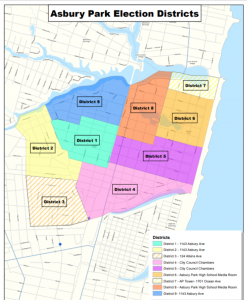2018 Asbury Park Municipal Ballot Questions Analyzed
League of Women Voters Breaks Down What’s At Stake In Nov 6 Elections
The League of Women Voters of the Township of Ocean [LWV] has put together a nonpartisan vetting of the Asbury Park Municipal Ballot questions ahead of the Nov. 6 elections.
“LWV member Kerry Butch was the driving force behind the ballot question explanation, urging the League to get involved and recruiting experts to help out,” League President Peggy Dellinger said.
In one week, voters will be asked to cast ballots for the unchallenged mayoral seat occupied by Mayor John Moor. They also must vote on the open three year seat currently filled by incumbent Jesse Kendle, who is being challenged by former Board of Education member Felicia Simmons, who was among a group of petitioners that brought forth the Wards and Partisan questions. Voters also must cast ballots on the Short-term Rental question brought forth by a separate group of petitioners.
Below is the LWV vetting:
Question 1: Wards
“Shall the charter of the City of Asbury Park, governed by the Council-Manager Plan of the Optional Municipal Charter Law, be amended as permitted under that plan, to provide for the division of the municipality into three wards with two council members to be elected at large and one from each ward?”
Official Interpretive Statement:
In November 2013, the voters of the City of Asbury Park adopted a Council-Manager Plan form of government [under the Optional Municipal Charter Law, which is also known as the Faulkner Act] with five council members to be elected at-large for staggered terms at a nonpartisan election held in November, with the potential of a run-off if no candidate received over 50 percent of the vote.
If this question is adopted, the City Council will reorganize into three wards, each with one council representative, with two additional seats elected at large, one of whom will continue to be designated and voted for under the title of Mayor.
League Interpretation:
If passed, voters would elect three council members each representing a specific section [ward] of the city and two council members “at large” (representing the city as a whole). One of the two at-large seats would still be designated for ‘Mayor.’ If passed, the ward system can be implemented as either partisan or nonpartisan, depending on the outcome of the second ballot question.
Reasons to vote Yes:
• The council member representing a ward is charged with concentrating on and advocating for the opportunities and specific needs of the residents of that ward.
• Members of minority groups historically have been more likely to be elected in a ward system.
• It is less expensive to run a campaign in a ward in comparison to the entire city, which would provide greater access to more candidates who desire to serve on council.
Reason to vote No:
• Asbury Park is too small to create artificial boundaries. Currently, each elected member of the governing body is charged with representing the opportunities and needs of the residents of the entire municipality.
• In the current system, residents cast five votes for local government: four for council members and one for mayor. In the ward system, residents cast just three votes: one for their ward representative, one for an at-large council member, and one for mayor.
• The boundaries of the wards will be determined by a commission made up of members of the Monmouth County Board of Elections together with the Municipal Clerk of the City of Asbury Park. The Municipal Clerk is the only member of the ward commission who is assured to be from Asbury Park.
Question 2: Partisan Elections
“Shall the charter of the City of Asbury Park, governed by the Council-Manager Plan of the Optional Municipal Charter Law, be amended as permitted under that plan, to provide for the holding of partisan general elections in November?”
Official Interpretive Statement:
In November 2013, the voters of the City of Asbury Park adopted a Council-Manager Plan form of government [under the Optional Municipal Charter Law, with is also known as the Faulkner Act] with five council members to be elected at-large for staggered terms at a nonpartisan election held in November, with the potential of a run-off if no candidate received over 50 percent of the vote.
If this question is adopted, the City Council will be elected pursuant to partisan elections, including June primaries, and by law, there will be no run-off elections.
League Interpretation:
Currently, candidates for City Council run without major party [Democrat or Republican] affiliation. If passed, elections would be partisan, and the political parties would choose their candidates in the June primary contests. The change would also eliminate run-off elections when no candidate receives a majority of votes. This question is independent of the first ballot question. That is, partisan elections can be implemented in either all-at-large or at-large-and-ward systems.
Reason to vote Yes:
• Candidates receiving a plurality of votes win, eliminating the cost of run-off elections.
• Political parties are equipped and funded to find and groom candidates.
• By tying Asbury Park elections to party politics, the city strengthens its influence on county and state major party platforms.
Reason to vote No:
• The change injects partisanship into local affairs at a time of deep division between the major parties. A partisan form of government means county and state party organizations will have influence over who runs for office in Asbury Park.
• Independents may be less likely to run.
• If one party represents a disproportionately large segment of the city’s population, choosing one candidate to represent each party in the general election will underrepresented the members of that majority party.
Question 3: Short-term Rentals
“Shall the ordinance submitted by initiative petition providing for revisions to Chapter 12, Section 8 of the Asbury Park Municipal Code regarding short-term regulations be adopted?”
Official Interpretive Statement:
In October of 2017, a petition and proposed ordinance to amend and supplement Chapter 12, Section 8 of the Asbury Park Municipal Code regarding short-term rental regulations were submitted to the City of Asbury Park by a Committee of Petitioners pursuant to the power of initiative as authorized by the Faulkner Act.
A vote of yes on this question will approve and adopt the ordinance as submitted by the Committee of Petitioners, which will revise the regulations relating to short-term rentals within the city. If this question is approved by a majority of the city’s voters, then the ordinance as submitted by the Committee of Petitioners will effectively replace the ordinance that was adopted by the Asbury Park City Council in November of 2017, which established different regulations governing the short-term rental of properties within the city.
League Interpretation:
If passed, the rules governing short-term rentals [30 days or less] in the city would be revised to decrease City regulation in face of the growing popularity of services like Airbnb, HomeAway or VRBO [Vacation Rentals by Owner]. Right now, the ordinance allows for short terms rentals as long as they involve the principal residence of the owner or if the property owner is grandfathered by a previous ordinance.
Passing this question will lift the principal residency requirement and allow for second or multiple homes to be rented out for thirty days or less, as well as allow short-term rentals by property owners who do not claim principal residency in Asbury Park.
Reasons to vote Yes:
• Easing of control provides more property rights for city homeowners who want to offer their second properties or multiple properties as short-term rentals.
• The existing ordinance is perceived as restrictive and onerous.
• The change will enable those who have purchased home(s) in Asbury Park, but do not claim principal residency, to rent out their property(ies) for 30 days or less.
Reasons to vote No:
• The existing ordinance provides effective oversight of this emerging and growing rental market and should not be weakened. Additionally, a no vote will allow for amendments as necessary, rather than waiting three years as required by referendum.
• Easing control will stimulate growth in short-term rentals in Asbury Park and potentially replace year-round affordable housing with expensive seasonal rentals.
• Year-round residents may be adversely affected by the growth of short-term rentals. They may lose the stability and security of knowing their neighbors as nearby properties become vacant during the off season and house a series of short-term vacationers in season.
The polls are open from 6 am to 8 pm Nov. 6. Click on the photo above right to find polling district and venue.
——————————————————————————————————-
Follow the Asbury Park Sun on Facebook, Twitter and Instagram.
The Asbury Park Sun is affiliated with the triCityNews newspaper.















